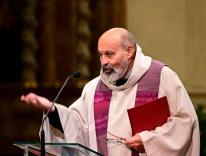It was only four years ago that Pope Benedict XVI visited Mexico, the world’s second-most populous Catholic country after Brazil. But the arrival of Pope Francis this weekend signals something different – in part, but not only, because he’s the first Latin American pontiff.
The Mexico that Francis will see is beset by multiple problems, maybe even more than it was four years ago. There’s the unimaginable violence of the drug cartels and the thousands of desaparecidos (not so different from Chile and Argentina during the dictatorships); there’s the blatant failure of the rule of law and administration of justice and the dire conditions of migrants from other Central American countries. Nativism and anti-immigrant sentiment in the United States, fanned by a number of Republican candidates for president, further complicate the picture, given the intimate social and economic ties between the two countries.
Meanwhile, the Mexican economy is now fourteenth in the world, owing largely to the extraction of natural resources in indigenous regions, whose inhabitants see few of the fruits of development. The pope who published Evangelii gaudium in 2013 and Laudato si’ in 2015 is bound to view the situation in a way his predecessors didn’t; it’s not that his social message is all that different, but rather that his background is.
Francis’s views on society, the economy, and politics derive from Gaudium et spes of Vatican II (1965) and from Paul VI’s encyclical Populorum progressio (1967) in a much more prominent way. Further, his take on social, economical, and political problems of a country is less influenced by the Vatican position on liberation theology that began to solidify in the 1980s; after a complicated relationship with liberation theology as a young Jesuit in Argentina, Francis has come around to it. The liberationist message has become an integral part of his pontificate, and this theological development contributes to his understanding of global Catholicism and of the church of the “global south” – of which the Latin-American church is surely a part. Theologically, one of the most interesting aspects of Francis’s Mexico trip will be how he teaches about a church and religious tradition that is quite different from the overwhelmingly white and culturally European Catholic culture of Argentina.
It’s also interesting to look at Francis’s trip in terms of where Mexico stands now compared to its paradigmatic place in twentieth-century Catholicism. If in the 1920s Italy and Germany embodied totalitarianism trying to cut a deal with the Vatican, and Soviet Russia was the concretization of atheistic Communism, then Mexico was the stage for a radical political modernization fueled by persecution of the Church and religious oppression – to which Catholicism responded with the clericalism of the Legionaries of Christ. But the Mexico that Francis finds is no longer a country that pushes Catholicism into the closet, and the Catholic Church is no longer dependent on the model of the Legionaries (and not only because of the now infamous double-life of Legionaries founder Marcial Maciel). In his speech to the bishops on Saturday, Pope Francis invited them not to rely on clericalism and triumphalism.
This also has consequences for the church’s public role (in his speech at the national palace on Saturday, Francis promised President Enrique Peña Nieto that “the government of Mexico can count on the cooperation of the Catholic Church”). Mexico is an example of the transition away from twentieth-century systems of ideological relations between Church and State (in a spectrum ranging from the established church of the fascist regimes to the official atheism of the communist states), and toward a new model of cooperation in a multi-religious and multicultural world whose features are not completely clear yet. Francis’s own deeply anti-ideological approach embodies this transition in global Catholicism today.


